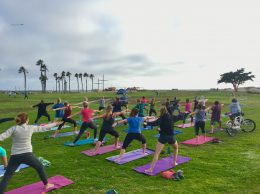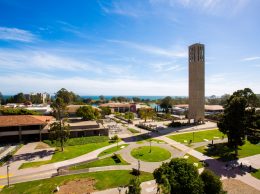At Westmont breakfast, author Michael Lewis talks of Santa Barbara’s ‘superhero of communicable disease’
IN THIS ARTICLE
- Health Care & Life Science Topic
- Tony Biasotti Author
By Tony Biasotti Monday, March 7th, 2022
On March 6, 2020, Westmont College held its annual President’s Breakfast, which would be one of the last large indoor, public events in the region before the COVID-19 pandemic arrived. The guest was Nobel-winning psychologist and economist Daniel Kahneman.
This year on March 4, at the event’s return to the Hilton Santa Barbara Beachfront Resort, the person sitting in the spot Kahneman occupied in 2020 was bestselling author and financial journalist Michael Lewis, and the first thing he talked about was “The Undoing Project,” his 2017 book about Kahneman and his research partner Amos Tversky.
Lewis’ best-known books include “Moneyball,” “The Blind Side” and “The Big Short,” all of which were adapted into hit movies, as well as his debut, “Liar’s Poker,” the story of his career as a Wall Street bond trader.
At the Westmont President’s Breakfast, the discussion between Lewis and Westmont President Gayle Beebe focused on Lewis’ three most recent books: “The Undoing Project”; 2018’s “The Fifth Risk,” about the botched handover of federal agencies from Barack Obama’s administration to Donald Trump’s; and 2021’s “The Premonition: A Pandemic Story.”
They make up in informal trilogy about the human and institutional capacities for error. “The Undoing Project” is about the ways in which our brains commonly misunderstand the world. The latter two books are about the federal government; “The Fifth Risk” describes a bureaucracy that seems ill-prepared for a true catastrophe, a portrayal that would be proven accurate in “The Premonition.”
One of the main characters of the last book was Dr. Charity Dean, a former health officer for Santa Barbara County who was one of the first people in the public health establishment to sound the alarm about COVID. She now has her own private sector firm in Santa Barbara, The Public Health Company.
When the pandemic began, Dean was in Sacramento as the assistant director of the California Department of Public Health. Lewis, who lives in Berkeley, was looking for someone to help him understand the pandemic and our nation’s response to it.
“I’m not looking for the famous person or the person in charge,” Lewis said. “I’m looking for the person who actually knows what’s going on … The answer came swiftly from lots of different directions: There’s this lady in the Department of Public Health, but she doesn’t run the Department of Public Health. It was Charity Dean.”
Lewis said he spent weeks in Santa Barbara reporting on Dean and her background, including her role in stopping an outbreak of a rare strain of meningitis at UC Santa Barbara in 2013. In addition to that high-profile incident, there were numerous cases of tuberculosis and other occasions for Dean to show remarkable bravery and quick thinking.
“I am so grateful to your community for spreading disease so well and allowing this superhero of communicable disease to do her job,” Lewis told the crowd at the Hilton Santa Barbara.
All the problems in the nation’s pandemic response system should have been obvious from Dean’s pre-pandemic career, Lewis said. The U.S. Centers for Disease Control advised Dean against her plan for stopping the meningitis outbreak, according to Lewis’ book, and Dean had to act essentially alone, knowing she’d take all the heat if anything went wrong.
“If you’d been a fly on the wall while she was doing that job, you’d have known we were in big trouble if there was a serious disease out there,” Lewis said. “To do her job well, she had to be way braver than she should have had to be. The Army was relying on a foot soldier’s extreme bravery, rather than smart planning and good leadership.”
Before their conversation about Lewis’ three most recent books, Beebe asked about his general approach to writing.
“I really just move through the world looking for stories that need to be told,” Lewis told the crowd of about 650. “Why write? There is the craven desire for attention, but for me the deep need that gets me back in the chair again is the need to understand the world around me. When I don’t write the world gets fuzzy. There is this clarity that comes in putting words to your observations.”
Related Articles
 Friday, July 8th, 2022
Friday, July 8th, 2022
Businesses adapt as cities end pandemic policies that allowed free use of public spaces
 Wednesday, May 11th, 2022
Wednesday, May 11th, 2022










